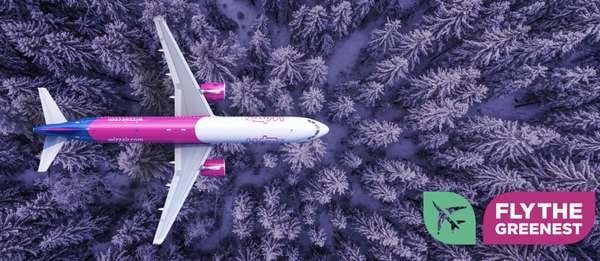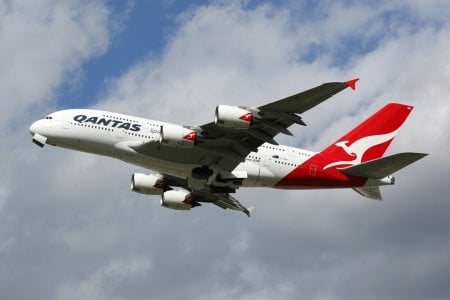Survey reveals 'worst' airline while Australian carrier ranks fifth among best
By
Seia Ibanez
- Replies 4
The world of air travel can be a minefield of hidden costs, delays, and poor customer service.
A recent survey conducted by UK consumer advocate Which? has shed light on the best and worst airlines, as voted by passengers.
The results may surprise you, especially if you're planning your next trip.
The survey, which assessed over 10,000 flights primarily used by British travellers, crowned Wizz Air, a Hungarian-based budget airline, the worst in the world for the second consecutive year in the short haul category.
The airline was criticised for its frequent delays and subpar customer service, with one passenger describing the airline as 'impossible' to communicate with when seeking assistance.
Wizz Air received a dismal one-star rating for customer service and failed to score more than two stars in any other category, including value for money.
'It's the lowest-scoring airline, with one star for customer service and seat comfort and a customer score lower than Ryanair,' the report stated.
'Incredibly, 44 per cent of passengers reported having some kind of problem–more than any other airline in our survey. High prices for luggage also mean that it’s not even that cheap for anybody taking a small case on board, which is surely most holiday-makers.’
The survey asked UK passengers to rate airlines on several factors, including customer service, value for money, seat comfort, and food and drink.
British Airways (BA), a long-standing stalwart of the aviation industry, also found itself surprisingly ranked among the 'worst' for both long and short-haul travel.
The UK-based carrier ranked low in each category, with aviation expert Alex McWhirter attributing the poor performance to cutbacks made to compete with low-cost carriers.
‘If it wants to go back to the good old days of food and drink service on board, it will have to increase prices, but customers won’t pay those prices,’ McWhirter said.
'Because of the image cultivated over the years, people expect more from a national carrier like BA, but these days they’re disappointed.’
BA is just a step above the poorest airlines in short-distance flights, along with its sister companies, Vueling and Iberia.
The report explained that BA received two stars for value and a low customer score of 59 per cent.
‘Worse, 3.3 per cent of flights were cancelled less than 24 hours before departure. Given how big BA is, that means tens of thousands of people had their plans torn up at the last minute,’ the report stated.
‘At least it now offers competitive prices on some short-haul routes. The fact that you don’t need to pay for a seat to sit with your travel companions–and cabin luggage is free–means it can be cheaper than some of its supposedly budget rivals.’
On a brighter note, the survey also revealed the airlines that are getting it right.
British budget airline Jet2.com ranked first in the 'short-haul best' category, followed by Icelandair, Norwegian, Turkish Airlines (which will launch in Australia next month), and Longanair in fifth place.
Australia's Qantas also made the list, ranking fifth in the 'best long-haul economy airlines' category.
The Aussie carrier scored three stars for customer service and boarding, four stars for seat comfort, food and drink, in-flight entertainment, cleanliness, and value for money.
However, Qantas did score the least in the 'on time' category at 43 per cent.
Qantas also lost its esteemed title as the world’s safest airline of 2023 following a year of turbulence and controversy, with Trans-Tasman rival Air New Zealand now bagging the title.
Some of the airline’s challenges include the sudden resignation of its controversial chief executive, Alan Joyce, in September, the secret cancellation of flights, complaints of lost baggage, and passengers waiting years for refunds on trips cancelled during the COVID-19 pandemic.
Singapore Airlines topped the list in the 'best long-haul' category, followed by Emirates, Virgin Atlantic, and Qatar Airways.
'The two airlines at the top of our long-haul table stand out for spotless planes, excellent entertainment systems and friendly service,' the report stated.
‘Emirates is punctual too, with three-quarters of flights arriving less than 15 minutes late. The only smirch on its reputation–and of most other luxury, long-haul carriers–is its “no-show” clause.’
The results of this survey serve as a reminder that not all airlines are created equal.
When planning your next trip, it's worth considering the experiences of other travellers to ensure you choose an airline that values customer service, punctuality, and value for money.
 What are your thoughts on these survey results? Have you had a particularly good or bad experience with an airline recently? Share your stories with us in the comments below!
What are your thoughts on these survey results? Have you had a particularly good or bad experience with an airline recently? Share your stories with us in the comments below!
A recent survey conducted by UK consumer advocate Which? has shed light on the best and worst airlines, as voted by passengers.
The results may surprise you, especially if you're planning your next trip.
The survey, which assessed over 10,000 flights primarily used by British travellers, crowned Wizz Air, a Hungarian-based budget airline, the worst in the world for the second consecutive year in the short haul category.
The airline was criticised for its frequent delays and subpar customer service, with one passenger describing the airline as 'impossible' to communicate with when seeking assistance.
Wizz Air received a dismal one-star rating for customer service and failed to score more than two stars in any other category, including value for money.
'It's the lowest-scoring airline, with one star for customer service and seat comfort and a customer score lower than Ryanair,' the report stated.
'Incredibly, 44 per cent of passengers reported having some kind of problem–more than any other airline in our survey. High prices for luggage also mean that it’s not even that cheap for anybody taking a small case on board, which is surely most holiday-makers.’
The survey asked UK passengers to rate airlines on several factors, including customer service, value for money, seat comfort, and food and drink.
British Airways (BA), a long-standing stalwart of the aviation industry, also found itself surprisingly ranked among the 'worst' for both long and short-haul travel.
The UK-based carrier ranked low in each category, with aviation expert Alex McWhirter attributing the poor performance to cutbacks made to compete with low-cost carriers.
‘If it wants to go back to the good old days of food and drink service on board, it will have to increase prices, but customers won’t pay those prices,’ McWhirter said.
'Because of the image cultivated over the years, people expect more from a national carrier like BA, but these days they’re disappointed.’
BA is just a step above the poorest airlines in short-distance flights, along with its sister companies, Vueling and Iberia.
The report explained that BA received two stars for value and a low customer score of 59 per cent.
‘Worse, 3.3 per cent of flights were cancelled less than 24 hours before departure. Given how big BA is, that means tens of thousands of people had their plans torn up at the last minute,’ the report stated.
‘At least it now offers competitive prices on some short-haul routes. The fact that you don’t need to pay for a seat to sit with your travel companions–and cabin luggage is free–means it can be cheaper than some of its supposedly budget rivals.’
On a brighter note, the survey also revealed the airlines that are getting it right.
British budget airline Jet2.com ranked first in the 'short-haul best' category, followed by Icelandair, Norwegian, Turkish Airlines (which will launch in Australia next month), and Longanair in fifth place.
Australia's Qantas also made the list, ranking fifth in the 'best long-haul economy airlines' category.
The Aussie carrier scored three stars for customer service and boarding, four stars for seat comfort, food and drink, in-flight entertainment, cleanliness, and value for money.
However, Qantas did score the least in the 'on time' category at 43 per cent.
Qantas also lost its esteemed title as the world’s safest airline of 2023 following a year of turbulence and controversy, with Trans-Tasman rival Air New Zealand now bagging the title.
Some of the airline’s challenges include the sudden resignation of its controversial chief executive, Alan Joyce, in September, the secret cancellation of flights, complaints of lost baggage, and passengers waiting years for refunds on trips cancelled during the COVID-19 pandemic.
Singapore Airlines topped the list in the 'best long-haul' category, followed by Emirates, Virgin Atlantic, and Qatar Airways.
'The two airlines at the top of our long-haul table stand out for spotless planes, excellent entertainment systems and friendly service,' the report stated.
‘Emirates is punctual too, with three-quarters of flights arriving less than 15 minutes late. The only smirch on its reputation–and of most other luxury, long-haul carriers–is its “no-show” clause.’
The results of this survey serve as a reminder that not all airlines are created equal.
When planning your next trip, it's worth considering the experiences of other travellers to ensure you choose an airline that values customer service, punctuality, and value for money.
Key Takeaways
- A survey conducted by Which? named Wizz Air as the world's worst airline for the second consecutive year, particularly in the 'best short-haul' category.
- British Airways also scored poorly, ranking among the 'worst' for both long and short-haul travel, with criticism over cutbacks in standards to compete with low-cost carriers.
- The only Australian carrier in the list, Qantas, ranked fifth in the 'best long-haul economy airlines' category but scored the least for 'on time' arrivals.
- The survey assessed airlines based on customer service, value for money, seat comfort, and food and drink, with Emirates and Singapore Airlines topping the 'best long-haul' category for their high standards.









